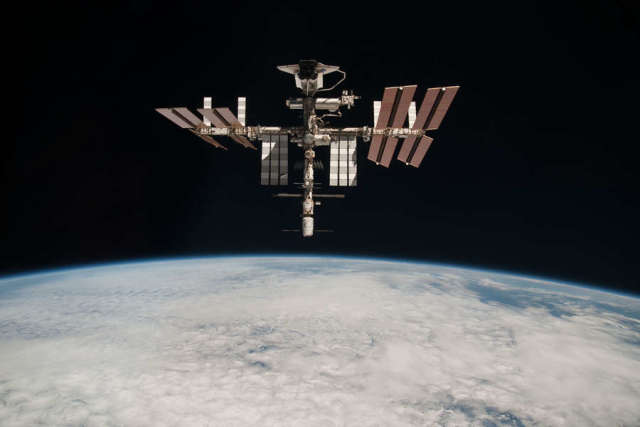Rogozin said that Russia has decided on the timing of the completion of work on the ISS
The decision on the deadline for the end of Russia's participation in the International Space Station program has already been made, but it will not be announced yet. According to the head of Roscosmos Dmitry Rogozin, Moscow will warn partners in a year about the completion of work on the ISS in accordance with its obligations. According to him, Russia continues to work on the orbital station until 2024.
The government has decided on the timing of the termination of Russian participation in the International Space Station project, but so far the decision will not be announced, said the head of Roscosmos Dmitry Rogozin.
Rogozin recalled that the timing of Russia's work on the space station is determined by the government and the president.
"For now, we will not rush to announce our position and will continue working within the deadline set by the government - until 2024. The decision on the fate of the ISS will largely depend on the situation that will develop both in our country and around it," the head of Roscosmos said.
Cosmonauts Sergey Korsakov, Oleg Artemyev and Denis Matveev are currently on the ISS.
What will happen to the ISS without Russia
On April 17, Nathan Eismont, a leading researcher at the Space Research Institute of the Russian Academy of Sciences, said that the operation of the ISS would become almost impossible if Russia withdrew from the program.
In turn, Roscosmos Executive Director for Manned Programs Sergey Krikalev said that cooperation between Russian and American specialists in space is necessary for productive work on the ISS.
He also said that the state corporation evaluates the technical condition of the Russian segment of the station for the possibility of extending its operation.
On April 11, Rogozin suggested that foreign partners could pay for the maintenance of the station in rubles if Moscow withdraws from the ISS project after 2024. According to the head of Roscosmos, when trying to save the station on their own, partners will have to compensate for the Russian absence with technical means that they do not have yet.
Russian Orbital Station
Rogozin also recalled plans to buildThe Russian Orbital Service Station (ROSS), which "will be multifunctional, work on it is already underway, a preliminary design is being developed by Energia Corporation.
It is assumed that ROSS can become a replacement for the ISS. This station will not be permanently inhabited, it is planned to launch up to two manned ships per year. The Russian station will be based on the NEM-1 module, which RSC Energia has been building for the ISS for almost ten years. The launch of the module is planned in the period from 2025-2026 to 2030. Other modules of the station, which have not yet been created, are expected to be launched from 2030 to 2035.
In early March, Roscosmos reported that it had already begun the preliminary design of its own space station.
Rogozin noted that the time gap between the operation of the ISS and the launch of a new station is undesirable, since in a few years you can lose skills in training crews and conducting research.
According to the head of the state corporation, the ISS and ROSS can be used in parallel for the first time.
"Due to financial constraints, we cannot simultaneously pull the ISS project and the construction of a new station. Of course, it is necessary to provide for a certain period of overlap when the ISS and ROSS will be operated in parallel for some time, as it was in the late 1990s - early 2000s, when Mir and the ISS flew simultaneously," he said.
Cooperation on the ISS under sanctions
According to Rogozin, NASA, the European and Canadian Space Agencies have made it clear that sanctions will not be lifted from Roscosmos enterprises, but they will not affect work in the interests of the ISS.
He called this state of affairs unacceptable, since the sanctions, according to him, are aimed at blocking the financial, economic and production activities of high-tech enterprises, their goal is "killing the Russian economy."
"The restoration of normal relations between partners on the International Space Station and other joint projects is possible only with the complete and unconditional lifting of illegal sanctions," Rogozin said.
Earlier, he reported that he had sent letters to NASA, ESA and the Canadian Space Agencies regarding the lifting of sanctions against TsNIIMash and the Progress Rocket and Space Center. In response letters, the United States and Canada named the continuation of the safe operation of the station as their priority. In turn, the head of NASA, Bill Nelson, pointed out that the current US sanctions do not affect the work of the ISS.
"The station will collapse by 2030"
At the beginning of March, Rogozin said that the ISS could "fall apart" before 2030, if "colossal money" was not invested in its repair.
"And the meaning? In conditions when the United States, the British and the Europeans behave in this way," he said and warned that risks would arise for the crew in case of an extension of the service life.
Earlier, he expressed the opinion that the ISS will be operated no longer than until 2028.
"I repeat, we will make a decision on the terms of operation of the Russian segment based primarily on technical limitations," the head of Roscosmos noted.
Daria Klester

